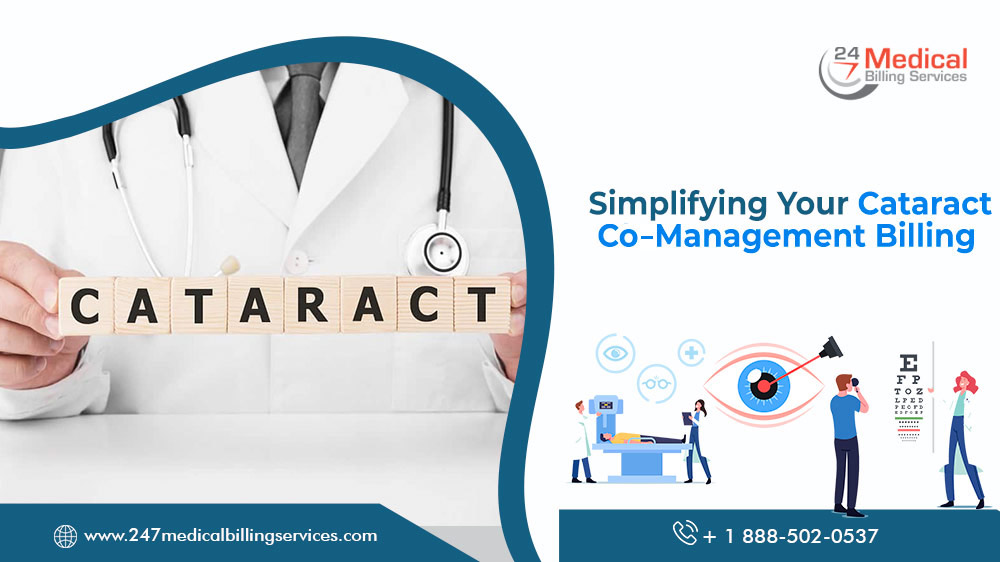
Simplifying Your Cataract Co-Management Billing
The number of people with cataracts in the United States is projected to double by 2050, from 24 million to around 50 million. This increasing cataract surgery appeal does coincide with a shortage of well-publicized physician of nearly 122,000 by 2032..
The need for more physicians is one of many challenges the optometry industry faces. But it accompanies several other issues whereby ophthalmology billing tops the list. That’s why surgeons are working on simplifying their cataract co-management billing as the earliest. The most exciting fact is that cataract co-management provides an excellent chance to serve patients, build relationships with local ophthalmologists, and expand your practice.
Let’s have a look at how you can simplify your cataract co-management billing:
- Coordinate Payment & Communication with OMD
The OD and OMD must be on identical pages to guarantee timely and complete payment. It is critical to ensure that the surgeon bills for cataract surgery with the appropriate modifiers and that the OD sends proper consultation paperwork to the surgeon.
Tracking when each doctor assumes responsibility for the patient's care when billing is essential. While working with cataract patients, you can also refer to a short piece on cataract co-management from the AOA. In fact, it is a quick read containing a wealth of knowledge on how to start billing cataract co-management. Surgeons frequently have more co-management billing expertise than optometrists and can be a valuable resource for ensuring you are medical billing correctly.
- Learn How to Educate Patients
Managing cataract patients' post-surgical expectations is an essential part of the procedure. From their initial consultation with the surgeon to their final post-operative day, ensuring that patients thoroughly know about the cataract surgery process is essential. For instance, patients must be made aware of the fact on how neuro-adaptation can take several months, during which time they may struggle to adjust to their new "eyes."
Also, patients should know how the two conditions (cataract and geographic atrophy) can impact their vision if they have a co-morbid disease, such as geographic atrophy. There is also a need to explain a theoretical spectrum of refractive correction requirements frequently. Not only this, patients should realize the significance of the post-operative time, as well as adherence to medications and follow-ups. In fact, it’s a strong belief that even the best surgery can be ruined if patients do not carefully follow post-operative instructions.
- Use the Correct Fee Structure
Once you've discovered the right surgeon to collaborate with and established the principles of the co-management relationship, it's critical that everyone involved understands the correct fee structure. (Including the patient). The fundamental logic is quite clear, i.e., one needs the surgeon’s bills for surgery and the optometrist’s invoices for post-operative care.
The surgeon's clinic employs code 66984-54 RT for standard cataract surgery with a monofocal IOL implanted. (Or LT, depending on which eye was done). Also, a diagnosis code is used (such as H25.12), and the claim will be submitted to the appropriate insurance company with a date when the service care was relinquished. THIS CLAIM ONLY APPLIES TO THE SURGICAL PORTION!
Whether on day one or day seven, when the patient returns to the co-managing O.D.'s office for follow-up care, the optometrist will submit a separate claim for the post-operative treatment. The claim will only be accepted if you use the same diagnosis number as the surgeon. (This highlights the requirement for a communication flow between offices).
In fact, it must be remembered that this procedure code remains the same, except for using the -55 modifier, which signifies post-operative treatment, instead of using the -54 modifier. RT or LT modifier is also required. (66984-55RT would be the proper code in this scenario.)
Outsource Your Cataract Co-Management Billing!
Collaborating with surgeons and cataract co-management billers is a valuable chance to offer pre- and post-operative cataract surgery care and accurate billing. It is an opportunity to supervise the care your patients receive before and after their procedure, increasing the likelihood of a positive result in high revenue. It's also an opportunity to broaden your services to your patients and grow your practice.
The first step in establishing a lucrative cataract co-management niche along with billing is to establish a good working relationship with a successful cataract co-management billing company with consistent optometry billing knowledge. One company that can serve this purpose is 24/7 Medical Billing Services, to further simplify your cataract co-management billing.
See also: Tips To Improve Ophthalmology Billing And Collections

.png)